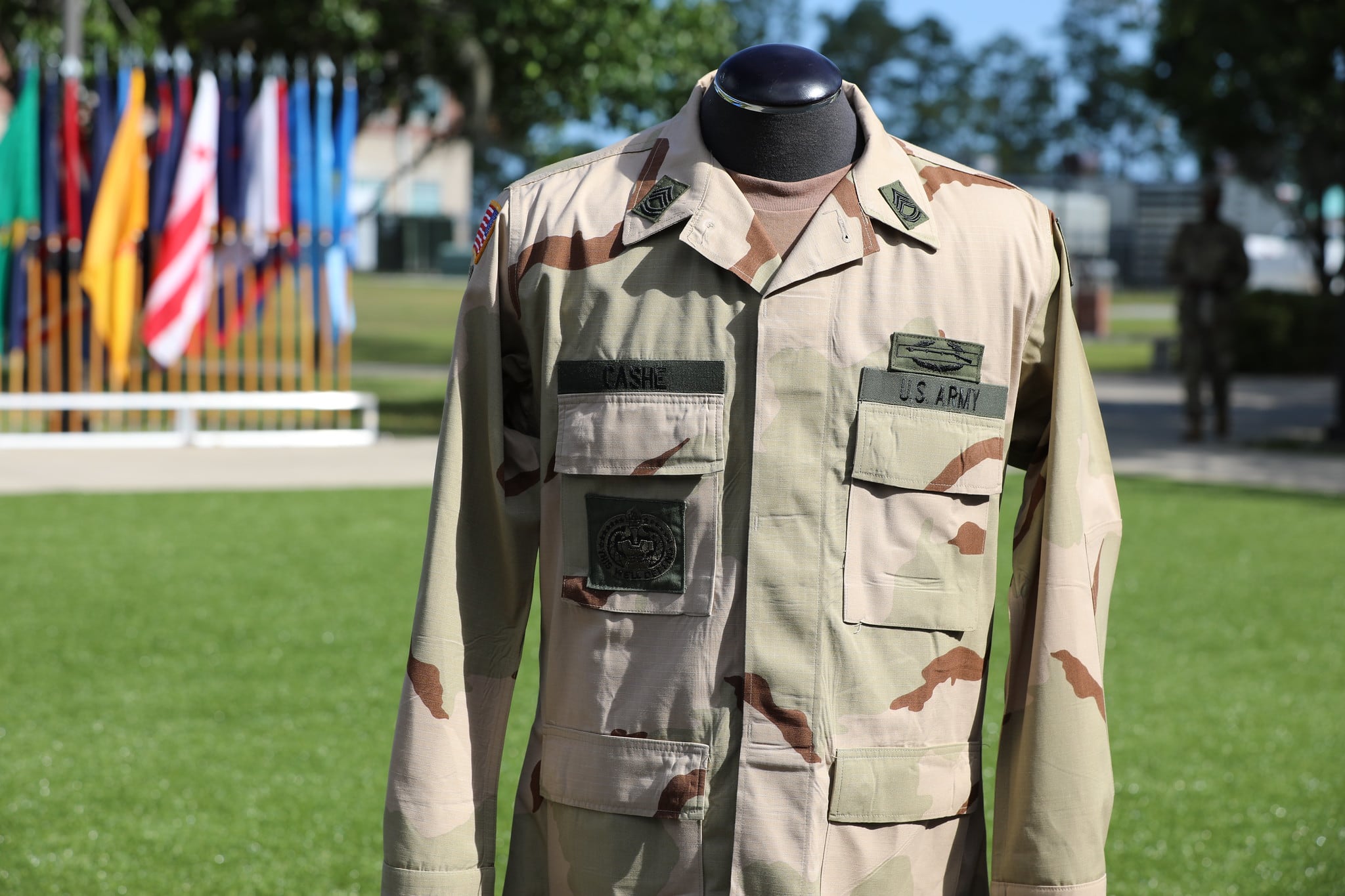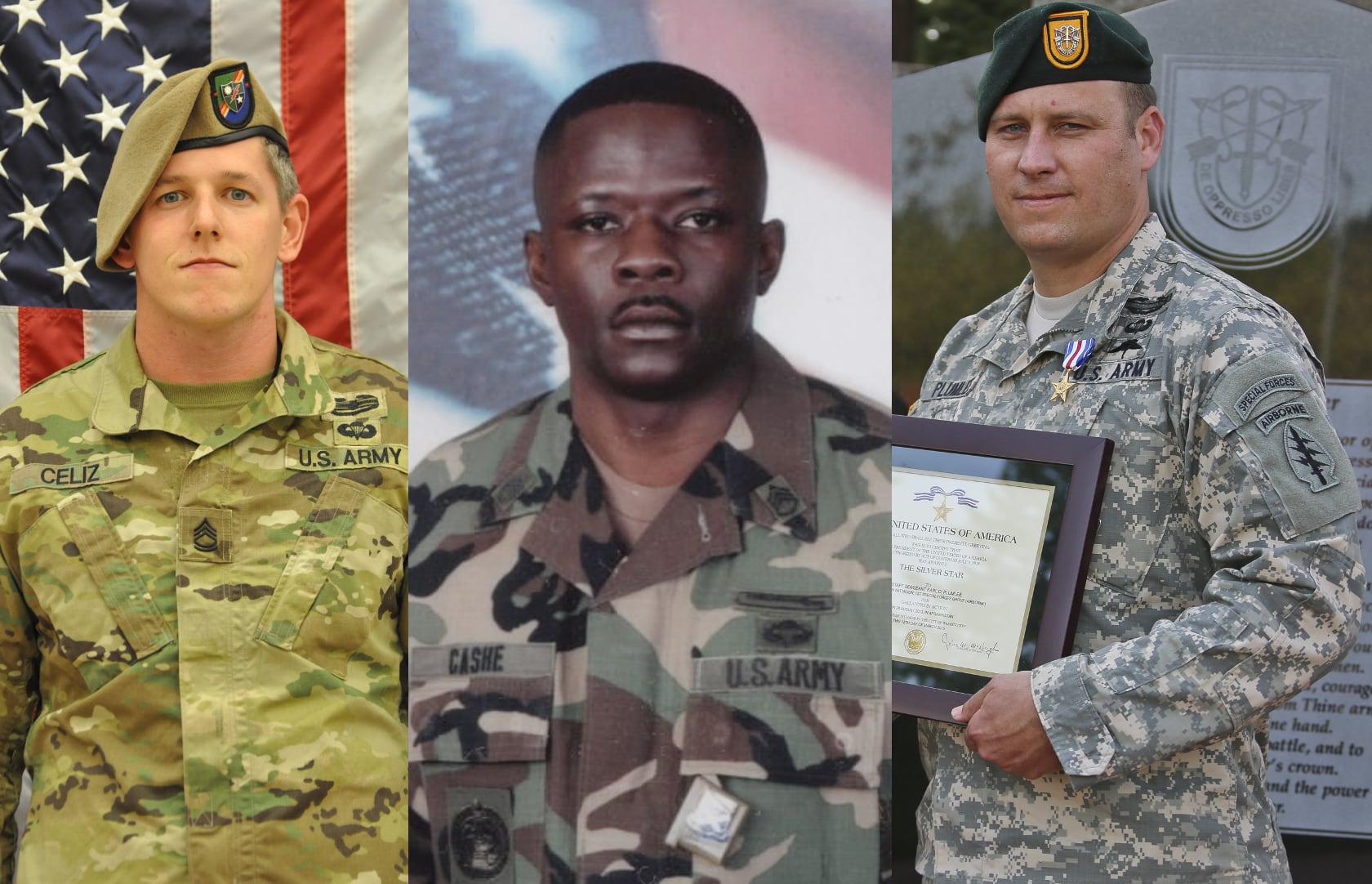On Thursday, Dec. 16, 2021, Sgt. 1st Class Alwyn Cashe will be posthumously awarded the Medal of Honor in recognition of his actions in Iraq in 2005. After his Bradley Fighting Vehicle hit an IED and caught fire, Cashe, relatively uninjured in the initial blast, returned to the vehicle multiple times to rescue his six soldiers who were on fire. In the process, he suffered severe burns over much of his body and died three weeks later.
Alwyn Cashe will be the first African American to be awarded the Medal of Honor for actions in Iraq or Afghanistan. The presentation follows a long campaign led by Cashe’s former commanders and comrades in arms to have the Silver Star he was initially awarded upgraded to the Medal of Honor.
I was privileged to serve as the battalion surgeon for Cashe’s unit ― 1st Battalion, 15th Infantry Regiment, 3rd Brigade, 3rd Infantry Division — during its year-long tour and was part of the medical team that provided combat casualty care to Cashe and the other wounded soldiers at the point of injury. Based on what I witnessed, Sgt. 1st Class Cashe’s actions that evening were not only an unbelievable example of courage and selflessness in deliberately sacrificing his own life to save those of his soldiers, but also the ultimate expression of the way he provided noncommissioned officer leadership to soldiers during that tour and throughout his Army career.
RELATED

In speaking with fellow soldiers who knew and served with Sgt. 1st Class Cashe immediately after the incident and in the 16 years since, I’ve yet to hear even one person express surprise at what Cashe did that evening which resulted in the loss of his life: It was completely in character with the way he led his platoon and cared for his soldiers.
At the time of the attack, we were nine months into our tour at a base near Samara, Iraq. For most of the soldiers in the unit, including Cashe and me, this was our second Iraq tour with 1-15 Infantry after participating in the initial invasion in 2003. Our first tour, though not without casualties, had been largely triumphant as we helped lead the push from Kuwait all the way to Baghdad, defeating Saddam Hussein and his forces in the process.
Our second tour, however, was a more difficult one. This time, our base was located in the Sunni Triangle, with the surrounding population generally hostile to U.S. forces. Vehicles leaving the base were frequently attacked, and over the year, the battalion lost 12 soldiers and had more than 100 wounded. Tremendous leadership was required to inspire soldiers to put their lives on the line day after day to accomplish their mission despite frequent enemy attacks.
I certainly did not work as closely with Sgt. 1st Class Cashe on a daily basis as the soldiers in his platoon or company, but as the battalion surgeon, I did have regular interactions with him on our small forward operating base over the course of the tour and was able to learn about him and see him in action fairly frequently.
As a platoon sergeant, Cashe was one of the key leaders who provided purpose, direction, and motivation to 1-15 Infantry soldiers. A former drill sergeant, he was certainly tough when needed and always enforced standards, but he did so while taking care of soldiers and always treating them with respect and dignity.
My first significant interaction with Cashe during that tour came early on when his vehicle was hit by an IED, and he and some of his soldiers suffered minor injuries. As the medics and I treated Cashe and his soldiers, I saw firsthand how he personally looked after his troops to ensure that they received top of the line care.
Later in the tour, when one of his soldiers was shot in the back and escaped with only a large abrasion due to his body armor, Cashe frequently accompanied him for his daily dressing changes and helped nurse him back to health. In all my dealings with him, Sgt. 1st Class Cashe was down to earth, personable, and acutely concerned about his soldiers’ welfare.
RELATED

I also got to see Sgt. 1st Class Cashe in action when I accompanied his platoon into the local town to provide medical care to village elders on several occasions. As the “platoon daddy,” Cashe served as a father figure to the young infantry soldiers in his platoon. Along with his platoon leader and other NCOs, he helped to create a sense of purpose and belonging on the team.
Motivating a platoon of young infantry soldiers from diverse backgrounds to leave the wire and risk their lives on a daily basis over a year-long tour was a significant leadership challenge, but Cashe was able to get the most out of his soldiers and to encourage their tenacity by treating them like a family. He and his platoon leader built a cohesive team of brothers with trust and confidence in each other.
Bookstore shelves are full of leadership books by well-compensated corporate executives, coaches, and generals, but there are far too few from NCOs and other front line leaders. Sgt. 1st Class Cashe, like many successful NCOs, taught leadership primarily by his actions rather than via lengthy speeches or the written word.
Like other outstanding Army leaders at all levels, Cashe insisted on enduring the same hardships and facing the same risks as his soldiers, always leading from the front.
Sgt. 1st Class Cashe, working together with his platoon and squad leaders, effectively built a cohesive team that worked together to accomplish whatever mission they were assigned. Cashe knew the strengths and weaknesses of all members of his team, and the intimate details of their lives.
On October 17, 2005, Cashe was in the gunner’s hatch of the lead Bradley Fighting Vehicle performing a route clearance mission during a sandstorm when his vehicle hit an IED, igniting the vehicle’s fuel cell and causing it to catch fire. Soaked with fuel and receiving small arms fire from the enemy, Cashe first assisted the driver, whose uniform was on fire, in extinguishing the flames. Six soldiers were trapped in the troop compartment as fire engulfed the vehicle and they caught fire.
Completely disregarding his own safety, Cashe repeatedly and deliberately returned to pull each of his soldiers out of the back of the burning, smoke-filled vehicle and extinguished their burning uniforms. In the process, flames engulfed Cashe’s fuel-soaked uniform, causing second and third degree burns over 72 percent of his body. In his final trip to the troop compartment, Cashe rescued Sgt. Michael Robertson, the platoon medic.
When Staff Sgt. Samuel Clark, a medic, and I arrived on scene with the quick reaction force, Cashe’s vehicle was engulfed in flame and 25 mm rounds inside were cooking off, making for a very chaotic scene. As we began treating the casualties and moving them to the casualty collection point, I watched as Cashe — despite his injuries and severe pain — remained on his feet and was moving from one wounded soldier to another to check on them and comfort them.
As we eventually prepared all of the patients for the medical evacuation flight to the combat support hospital, Cashe remained alert and continued to inspire his soldiers to stay strong. He insisted that we treat the nine other injured soldiers before we cared for him and directed us to load the other wounded soldiers onto the medevac helicopters before him, despite his grievous wounds.
Tragically, over the next several weeks three of the rescued soldiers died of their wounds. Sgt. 1st Class Cashe endured for as long as he could but eventually required an amputation of his right leg and developed multiple organ failure. He died of his wounds on November 8, 2005.
Sgt. 1st Class Cashe displayed incredible courage and selflessness in sacrificing his own life to save his soldiers and then doing everything he could to motivate, comfort, and inspire them despite his own injuries. From what I witnessed personally and learned from others who served alongside him, his actions that terrible night were completely consistent with the way he lived his life and led his troops.
Cashe’s sacrifice of his own life to save his troops was a demonstration of humanity at its absolute finest, but I don’t think anyone who served alongside him would have ever doubted that he would do absolutely anything required to save “his boys.”
Very few of us possess the extreme selflessness and courage of Alwyn Cashe. But all of us can learn from his style of leadership — always caring for and showing genuine concern for our soldiers or subordinates, treating them as if they were family members, sharing hardships shoulder to shoulder, and, in the words of the Army NCO creed, putting their needs before our own.
After almost two decades of war and with a frequently unyielding operations tempo, the Army has struggled at times in recent years to ensure that its leaders are always fully engaged with the health, safety, welfare, and struggles of their soldiers. As Army leaders continue to confront multiple difficult challenges, striving to emulate Sgt. 1st Class Cashe’s selfless and soldier-centered approach is a great place to start.
Col. Mike Tarpey is an active duty Army Medical Corps officer currently serving as the commander of the Army Aeromedical Research Lab.
The views expressed in this article are those of the author and do not reflect the official policy or position of the U.S. Army, the Department of Defense, or the U.S. Government.
Editor’s note: This is an Op-Ed and as such, the opinions expressed are those of the author. If you would like to respond, or have an editorial of your own you would like to submit, please contact Military Times managing editor Howard Altman, haltman@militarytimes.com.





